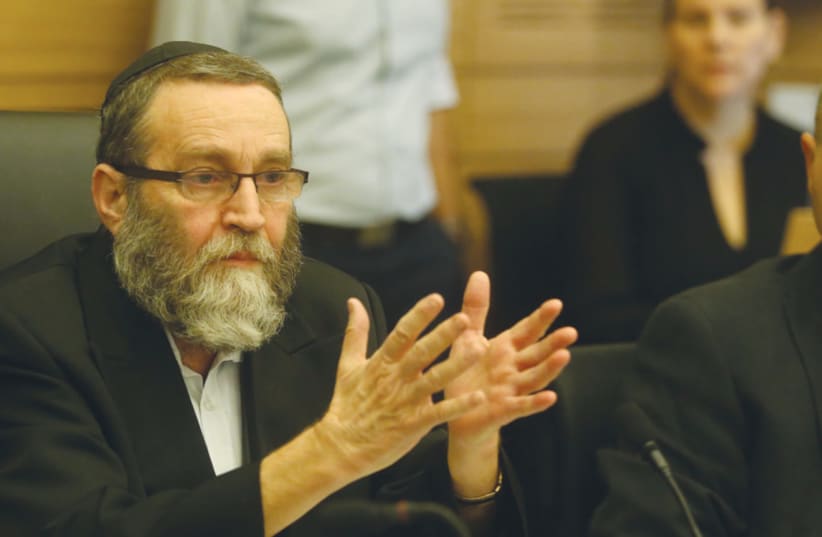Chairman of the ultra-Orthodox United Torah Judaism Party MK Moshe Gafni backtracked on comments he made suggesting his party might back another candidate to form a government other than Prime Minister Benjamin Netanyahu.
Gafni said Saturday night that “if Netanyahu will not have 61 seats [in his right-wing bloc] we will think before going to fifth elections,” and did not rule out recommending Naftali Bennett or Gideon Sa’ar to form a government.
This led to accusations on the Right that UTJ might back another candidate to form a government such as Bennett or Sa’ar, prompting Gafni to issue a rebuttal on Sunday, fearing an erosion of support from elements within the ultra-Orthodox community who are attracted to MK Bezalel Smotrich’s Religious Zionist Party.
“We’re going with Netanyahu because the traditional public is with the Likud,” insisted Gafni in a small outdoor UTJ campaign event, in reference to the large bloc of religiously traditional Mizrachi voters who constitute the main voter base of the Likud.
“We go with the traditional community not because we’re Right, Left, or center, but we are UTJ and we do as instructed by our rabbis... We will not go with anyone else. We will go in accordance with the instructions of our rabbis, we are going with the head of the Likud.”
UTJ is extremely worried that enough voters from the ultra-Orthodox community will back Smotrich’s ultra-nationalist party, which is also just as conservative on religious issues as the haredi parties are.
An indication of this concern is an anonymous election ad campaign highlighting two issues where Smotrich’s party is ostensibly at odds with the rulings and decisions of ultra-Orthodox rabbis.
One ad highlights that the fifth placed candidate on the Religious Zionist Party’s electoral list, Orit Struck, voted in favor of a bill to increase ultra-Orthodox enlistment to the IDF.
Another points out that the third placed candidate, Itamar Ben Gvir, is a strong proponent of Jewish visiting and prayer rights on the Temple Mount, something ultra-Orthodox rabbis oppose due to religious requirements needed to visit the site.
Separately, Shas chairman and Interior Minister Arye Deri said that it was “not the natural place” of ultra-Orthodox women to seek political office.
Speaking on KAN radio, Deri was asked why his party has no women candidates on its electoral list.
Although Shas’ party regulations do not forbid women as candidates, as UTJ’s does, its ideological position is nevertheless opposed to female representation on various religious grounds.
“Their education is that the public domain of politics is not their natural place,” said Deri.
He added that any ultra-Orthodox women who do want to be in the public domain are a “minority of a minority of a minority who to my distress contradict the educational direction of the majority of our women.”
Added Deri: “If they establish a party the first people not to vote for them will be our women.”
